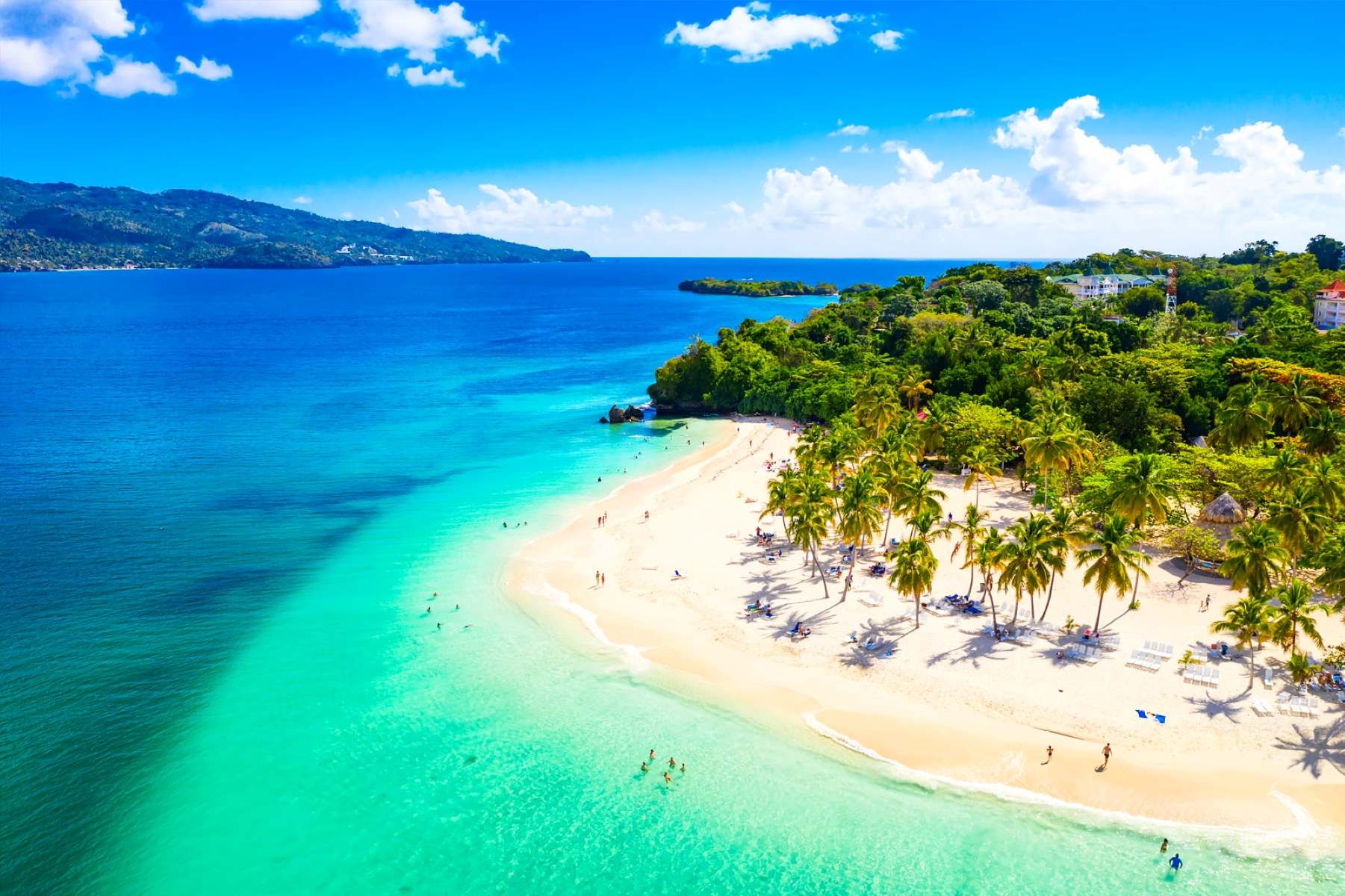Home>Travel and Places>10 Shocking Stereotypes About The Dominican Republic: Debunked!


Travel and Places
10 Shocking Stereotypes About The Dominican Republic: Debunked!
Published: February 10, 2024
Uncover the truth about the Dominican Republic as we debunk 10 shocking stereotypes. Get ready to explore the real beauty of this travel destination.
(Many of the links in this article redirect to a specific reviewed product. Your purchase of these products through affiliate links helps to generate commission for Regretless.com, at no extra cost. Learn more)
Table of Contents
- Introduction
- Stereotype 1: Dominicans are lazy
- Stereotype 2: The Dominican Republic is extremely dangerous
- Stereotype 3: Dominicans are uneducated
- Stereotype 4: All Dominicans are involved in illegal activities
- Stereotype 5: Dominican women are all gold diggers
- Stereotype 6: Dominicans are all obsessed with baseball
- Stereotype 7: The Dominican Republic is a third-world country
- Stereotype 8: All Dominicans are of African descent
- Stereotype 9: The Dominican Republic is a terrible place to visit
- Stereotype 10: Dominicans are all loud and aggressive
- Conclusion
Introduction
The Dominican Republic is a captivating Caribbean nation known for its stunning beaches, rich culture, and warm hospitality. However, like many countries, it is often subjected to various stereotypes that can overshadow its true essence. In this article, we will debunk 10 shocking stereotypes about the Dominican Republic, shedding light on the reality behind these misconceptions. By exploring these stereotypes, we aim to provide a deeper understanding of the country and its people, ultimately dispelling myths that may hinder genuine appreciation and connection with this vibrant destination.
Throughout history, stereotypes have been perpetuated through media, word of mouth, and limited personal experiences. These generalizations often fail to capture the complexities and nuances of a diverse society, leading to misconceptions that can shape perceptions from afar. By addressing these stereotypes, we can challenge preconceived notions and encourage a more open-minded approach to understanding the Dominican Republic.
As we delve into each stereotype, we will uncover the truth behind these misconceptions, drawing from authentic experiences, cultural insights, and statistical data. Through this exploration, we hope to paint a more accurate and multifaceted portrait of the Dominican Republic, highlighting the resilience, diversity, and warmth of its people. By debunking these stereotypes, we aim to celebrate the country's unique identity and showcase the beauty that lies beyond the confines of misconceptions.
Join us on this journey as we unravel the truth behind these 10 shocking stereotypes about the Dominican Republic, paving the way for a deeper appreciation of this enchanting destination. Let's embark on a quest to challenge assumptions, embrace diversity, and celebrate the rich tapestry of the Dominican Republic.
Stereotype 1: Dominicans are lazy
The stereotype that Dominicans are lazy is a gross oversimplification that fails to acknowledge the industrious spirit deeply ingrained in Dominican culture. In reality, the people of the Dominican Republic are hardworking, resilient, and resourceful individuals who consistently demonstrate dedication and perseverance in various aspects of their lives.
From bustling urban centers to rural communities, Dominicans actively engage in a wide range of professions, contributing to the country's economic and social development. Whether it's the entrepreneurial endeavors of small business owners, the laborious work of agricultural workers in the fertile valleys, or the unwavering commitment of healthcare professionals in hospitals and clinics, the Dominican workforce is characterized by its unwavering work ethic.
Moreover, the vibrant arts and entertainment scene in the Dominican Republic is a testament to the creativity and passion of its people. From the rhythmic beats of merengue and bachata to the colorful displays of traditional crafts, Dominicans pour their hearts and souls into artistic expressions that captivate audiences worldwide. This dedication to artistic pursuits requires discipline, creativity, and a strong work ethic, debunking the lazy stereotype attributed to the Dominican people.
In the tourism industry, which plays a pivotal role in the country's economy, hospitality professionals work tirelessly to ensure that visitors experience the warmth and beauty of the Dominican Republic. Their commitment to providing exceptional service and creating memorable experiences reflects the opposite of laziness, showcasing a genuine desire to share the country's treasures with the world.
Furthermore, the resilience displayed by Dominicans in the face of natural disasters and economic challenges is a testament to their unwavering determination. Whether rebuilding communities after hurricanes or innovating to overcome economic obstacles, the people of the Dominican Republic consistently demonstrate a proactive and resilient approach, dispelling the notion of laziness.
In essence, the stereotype that Dominicans are lazy is a baseless generalization that overlooks the industrious spirit and unwavering dedication of the country's people. By debunking this misconception, we can appreciate the hard work, creativity, and resilience that define the vibrant tapestry of Dominican society.
Stereotype 2: The Dominican Republic is extremely dangerous
The stereotype portraying the Dominican Republic as an extremely dangerous destination is a misconception that warrants debunking. While it is important to acknowledge that every country faces its unique set of challenges, the portrayal of the Dominican Republic as a universally perilous place oversimplifies the complex reality of safety and security within the nation.
In truth, the Dominican Republic offers a diverse array of experiences, from tranquil beach retreats to vibrant cultural excursions, where visitors can explore its natural wonders and immerse themselves in its rich heritage. While no destination is immune to isolated incidents, the majority of travelers to the Dominican Republic enjoy their visits without encountering any safety concerns.
The tourism industry, a vital component of the Dominican economy, has implemented robust measures to ensure the safety and well-being of visitors. Popular tourist areas, such as Punta Cana and Puerto Plata, are equipped with modern infrastructure and security protocols, providing a secure environment for travelers to relax and indulge in the country's beauty.
Moreover, the Dominican Republic is home to warm and welcoming communities that embrace visitors with genuine hospitality. Locals often extend a helping hand to ensure that tourists feel safe and comfortable, fostering an atmosphere of inclusivity and warmth.
It is essential to approach travel to the Dominican Republic, as with any destination, with a degree of vigilance and awareness of one's surroundings. By exercising common-sense precautions and respecting local customs and regulations, travelers can enhance their safety and minimize potential risks.
Furthermore, government and law enforcement agencies in the Dominican Republic have implemented initiatives to enhance public safety and address any security concerns. Through collaborative efforts, authorities work to uphold the well-being of both residents and visitors, contributing to a safer and more secure environment.
By debunking the stereotype that the Dominican Republic is extremely dangerous, we can foster a more nuanced understanding of the country's safety landscape. Through informed perspectives and responsible travel practices, visitors can appreciate the diverse offerings of the Dominican Republic while embracing enriching experiences with confidence and peace of mind.
Stereotype 3: Dominicans are uneducated
The stereotype that Dominicans are uneducated is a misguided generalization that overlooks the rich intellectual heritage and educational achievements within the Dominican Republic. In reality, the country boasts a robust educational system and a population that values learning and knowledge.
Education is highly prioritized in Dominican society, with significant investments made in both public and private educational institutions. The government has implemented initiatives to enhance access to education, striving to ensure that all citizens have the opportunity to pursue academic and intellectual growth. As a result, the Dominican Republic has made notable progress in expanding educational opportunities, particularly in rural and underserved communities.
At the primary and secondary levels, efforts have been made to improve enrollment rates and enhance the quality of education. Through targeted interventions and educational reforms, the Dominican government has sought to equip students with the skills and knowledge necessary to thrive in an increasingly globalized world.
Furthermore, the country is home to esteemed universities and higher education institutions that offer diverse academic programs and opportunities for advanced learning. These institutions play a pivotal role in cultivating a new generation of professionals, scholars, and innovators who contribute to the country's intellectual capital and economic development.
Beyond formal education, Dominicans exhibit a deep appreciation for lifelong learning and intellectual pursuits. Cultural institutions, such as museums, libraries, and cultural centers, serve as vibrant hubs of knowledge and creativity, fostering a love for the arts, literature, and history. Additionally, the tradition of oral storytelling, passed down through generations, reflects a profound respect for wisdom and knowledge within Dominican culture.
Moreover, Dominicans have made significant contributions to various fields, including literature, music, science, and academia, demonstrating the intellectual prowess and creative ingenuity of the country's people. From renowned authors and poets to influential scientists and thought leaders, Dominicans have left an indelible mark on the global stage, challenging the stereotype of being uneducated.
By debunking the stereotype that Dominicans are uneducated, we can celebrate the country's commitment to learning, knowledge, and intellectual exploration. Through a more nuanced understanding of Dominican education and intellectual pursuits, we can recognize the profound contributions of the country's scholars, artists, and educators to the global community.
Stereotype 4: All Dominicans are involved in illegal activities
The stereotype that all Dominicans are involved in illegal activities is a damaging and unfounded generalization that perpetuates harmful misconceptions about the Dominican people. Such a sweeping assertion fails to acknowledge the vast majority of law-abiding citizens and undermines the diverse contributions of Dominicans to various lawful and productive endeavors.
In reality, the Dominican Republic is home to countless individuals who uphold the principles of integrity, honesty, and ethical conduct. From dedicated professionals in fields such as healthcare, education, entrepreneurship, and public service to hardworking laborers and artisans, the vast majority of Dominicans are law-abiding citizens who contribute positively to their communities and the nation as a whole.
Moreover, the Dominican government has implemented stringent laws and regulations to combat illegal activities and uphold the rule of law. Law enforcement agencies work diligently to enforce these measures, ensuring the safety and well-being of citizens and visitors alike. Through collaborative efforts with international partners, the Dominican Republic has demonstrated a steadfast commitment to combating illicit activities and promoting a secure environment for all.
Furthermore, the vibrant cultural heritage of the Dominican Republic is a testament to the creativity, resilience, and artistic expression of its people. From the captivating rhythms of merengue and bachata to the colorful displays of traditional crafts and visual arts, Dominicans channel their creative energies into enriching cultural experiences that celebrate their heritage and identity.
By debunking the stereotype that all Dominicans are involved in illegal activities, we can recognize and celebrate the law-abiding citizens, cultural ambassadors, and hardworking individuals who contribute to the fabric of Dominican society. Through a more nuanced understanding of the diverse pursuits and contributions of the Dominican people, we can dispel harmful misconceptions and foster a greater appreciation for the multifaceted tapestry of the Dominican Republic.
Stereotype 5: Dominican women are all gold diggers
The stereotype that all Dominican women are gold diggers is a harmful and baseless generalization that perpetuates damaging misconceptions about the character and motivations of women in the Dominican Republic. Such a sweeping assertion fails to recognize the diverse personalities, aspirations, and values of Dominican women, undermining the individuality and integrity of an entire demographic.
In reality, Dominican women are multifaceted individuals with diverse talents, ambitions, and passions. They encompass a wide spectrum of roles and contributions within their families, communities, and professional spheres. From dedicated mothers and caregivers to accomplished professionals in fields such as healthcare, education, business, and the arts, Dominican women play integral roles in shaping the social, cultural, and economic landscape of the country.
Furthermore, Dominican women are known for their resilience, creativity, and entrepreneurial spirit. Many women in the Dominican Republic have pursued independent business ventures, demonstrating their resourcefulness, determination, and commitment to economic empowerment. Whether as artisans, small business owners, or professionals, these women have made significant contributions to the country's economy and cultural heritage, challenging the stereotype of being solely motivated by material wealth.
Moreover, the nurturing and compassionate nature of Dominican women is evident in their dedication to supporting their families and communities. They often serve as pillars of strength, providing emotional support, guidance, and care to those around them. Their contributions extend beyond financial considerations, encompassing the invaluable qualities of empathy, wisdom, and resilience.
It is essential to recognize that the stereotype of Dominican women as gold diggers overlooks the complexities of their experiences, relationships, and personal values. By debunking this damaging misconception, we can celebrate the diverse strengths, aspirations, and contributions of Dominican women, fostering a more respectful and inclusive understanding of their roles within society.
In essence, the portrayal of Dominican women as gold diggers is a harmful oversimplification that fails to capture the multifaceted identities and contributions of women in the Dominican Republic. By challenging this stereotype, we can acknowledge the individuality, resilience, and diverse aspirations of Dominican women, promoting a more nuanced and respectful portrayal of their experiences and roles within society.
Stereotype 6: Dominicans are all obsessed with baseball
The stereotype that all Dominicans are obsessed with baseball is deeply ingrained in popular perceptions of the Dominican Republic. While it is true that baseball holds a special place in the hearts of many Dominicans, the notion that every individual in the country is fervently dedicated to the sport oversimplifies the diverse interests, passions, and pursuits of the Dominican people.
Baseball undeniably occupies a prominent position within the cultural fabric of the Dominican Republic. The sport has a rich history in the country, dating back to the late 19th century when it was introduced by Cuban immigrants. Over the years, baseball has evolved into a cherished national pastime, captivating the imagination of fans and aspiring athletes alike. The country has produced a remarkable number of talented baseball players who have achieved international acclaim, further cementing the sport's significance within Dominican society.
The passion for baseball is palpable in the streets, parks, and stadiums across the nation, where communities gather to celebrate the game and rally behind their favorite teams. The sport serves as a unifying force, fostering camaraderie and pride among fans of all ages. Moreover, baseball has provided opportunities for social mobility and personal fulfillment, inspiring countless young athletes to pursue their dreams and showcase their talents on a global stage.
However, it is essential to recognize that the stereotype of all Dominicans being obsessed with baseball overlooks the diverse array of interests and pursuits that define the country's populace. While many individuals hold a deep affection for the sport, others may find fulfillment in different forms of artistic expression, academic pursuits, entrepreneurial endeavors, and cultural traditions. The multifaceted nature of Dominican society encompasses a rich tapestry of passions and aspirations that extend beyond the realm of sports.
By debunking the stereotype that all Dominicans are obsessed with baseball, we can celebrate the cultural significance of the sport while acknowledging the diverse interests and talents that shape the country's social landscape. Through a more nuanced understanding of the varied passions and pursuits of the Dominican people, we can embrace the richness and complexity of their cultural identity, transcending simplistic generalizations to appreciate the multifaceted nature of Dominican society.
Stereotype 7: The Dominican Republic is a third-world country
The stereotype depicting the Dominican Republic as a third-world country is a misconception that fails to capture the country's multifaceted identity and ongoing development. While the Dominican Republic, like many nations, faces socioeconomic challenges, it is essential to recognize the significant strides it has made in various aspects of national progress.
The Dominican Republic has demonstrated a commitment to economic growth, infrastructure development, and social advancement, positioning itself as a dynamic and evolving nation. The government has implemented strategic initiatives to bolster key sectors such as tourism, agriculture, manufacturing, and technology, fostering economic diversification and resilience. These efforts have contributed to the country's emergence as a regional leader in industries such as renewable energy, medical tourism, and agribusiness, showcasing its potential for sustained prosperity.
Moreover, the Dominican Republic has made substantial investments in modernizing its infrastructure, including transportation networks, telecommunications, and urban development. Major cities such as Santo Domingo and Santiago feature modern amenities, vibrant cultural hubs, and thriving business districts, reflecting the country's urban dynamism and cosmopolitan character.
In the realm of education and healthcare, the Dominican Republic has pursued initiatives to enhance access to quality services and promote human development. The government has prioritized educational reforms, expanding educational opportunities and promoting literacy, while also investing in healthcare infrastructure and public health programs to improve the well-being of its citizens.
Furthermore, the Dominican Republic has actively engaged in global partnerships and diplomatic initiatives, contributing to international dialogue and cooperation on issues ranging from environmental conservation to human rights advocacy. The country's participation in regional organizations and multilateral forums underscores its commitment to global citizenship and collaborative problem-solving.
By debunking the stereotype that the Dominican Republic is a third-world country, we can appreciate the country's ongoing journey of progress, resilience, and innovation. Through a more nuanced understanding of its economic, social, and diplomatic advancements, we can celebrate the dynamic spirit and potential of the Dominican Republic, transcending outdated classifications to embrace its evolving role in the global community.
Stereotype 8: All Dominicans are of African descent
The stereotype that all Dominicans are of African descent oversimplifies the rich tapestry of ethnic and cultural diversity within the Dominican Republic. While it is undeniable that the African heritage has profoundly influenced the country's identity, the Dominican population comprises a complex mosaic of ancestral origins, reflecting centuries of migration, intermingling, and heritage.
The history of the Dominican Republic is intricately intertwined with the legacies of indigenous Taíno peoples, European colonizers, and enslaved Africans. The arrival of Spanish conquistadors in the 15th century marked the beginning of a complex cultural exchange that shaped the country's demographics and traditions. The indigenous Taíno population, though tragically diminished by the impact of colonization, contributed enduring influences to Dominican language, cuisine, and customs. Subsequent waves of African and European migration further enriched the nation's ethnic composition, yielding a diverse spectrum of racial and cultural identities.
The resulting blend of African, European, and indigenous heritage has given rise to a vibrant and multifaceted Dominican identity. While many Dominicans proudly embrace their African roots, it is essential to recognize the diversity of racial and ethnic backgrounds that characterize the country's populace. From individuals of predominantly European descent to those with mixed ancestry encompassing African, Taíno, and European heritage, the Dominican Republic reflects a kaleidoscope of identities that defy simplistic categorizations.
Furthermore, the cultural expressions of the Dominican people encompass a rich amalgamation of influences, from the rhythmic beats of Afro-Caribbean music to the vibrant colors of traditional crafts and art forms. The legacy of African heritage is palpable in the country's music, dance, cuisine, and religious practices, underscoring the enduring impact of diverse ancestral legacies on Dominican culture.
By debunking the stereotype that all Dominicans are of African descent, we can celebrate the diverse ethnic tapestry and historical legacies that define the country's identity. Embracing the complexities of Dominican heritage fosters a more inclusive and respectful understanding of the nation's cultural richness, transcending oversimplified narratives to honor the multifaceted origins and traditions that shape the Dominican Republic.
Stereotype 9: The Dominican Republic is a terrible place to visit
The stereotype portraying the Dominican Republic as a terrible place to visit is a misconception that fails to capture the captivating allure and diverse offerings of this enchanting Caribbean nation. Contrary to this unfounded generalization, the Dominican Republic stands as a vibrant and welcoming destination that beckons travelers with its breathtaking landscapes, rich cultural heritage, and warm hospitality.
From the pristine shores of Punta Cana to the lush greenery of the Samaná Peninsula, the Dominican Republic boasts an abundance of natural splendors that captivate visitors from around the globe. The country's diverse topography encompasses majestic mountain ranges, cascading waterfalls, and idyllic coastal retreats, offering a myriad of opportunities for outdoor adventures, eco-tourism, and relaxation. Whether exploring the vibrant coral reefs of the Caribbean Sea or embarking on a trek through the verdant rainforests, travelers are greeted by the unparalleled beauty of the Dominican landscape.
Moreover, the country's rich cultural tapestry is woven with a captivating array of traditions, music, and culinary delights that reflect the fusion of indigenous, African, and European influences. From the spirited rhythms of merengue and bachata to the tantalizing flavors of traditional Dominican cuisine, visitors are immersed in a sensory journey that celebrates the country's vibrant heritage. Additionally, the colonial architecture of Santo Domingo, a UNESCO World Heritage site, invites travelers to step back in time and explore the historical legacy of the Caribbean's oldest city.
The warmth and hospitality of the Dominican people further enhance the allure of the country, creating an atmosphere of genuine connection and inclusivity. Visitors are welcomed with open arms, invited to partake in local festivities, and encouraged to engage with the rich tapestry of Dominican culture. Whether savoring the renowned hospitality of luxury resorts or engaging with local communities in rural villages, travelers are embraced by the warmth and generosity of the Dominican spirit.
By debunking the stereotype that the Dominican Republic is a terrible place to visit, we can celebrate the country's natural beauty, cultural vibrancy, and welcoming embrace. Through a more nuanced understanding of its diverse attractions and genuine hospitality, we can invite travelers to embark on a transformative journey that reveals the true essence of the Dominican Republic, transcending misconceptions to embrace the boundless wonders of this captivating destination.
Stereotype 10: Dominicans are all loud and aggressive
The stereotype depicting Dominicans as universally loud and aggressive is a gross oversimplification that fails to capture the nuanced characteristics and diverse personalities of the Dominican people. While it is true that the Dominican culture is often associated with exuberance and passion, the portrayal of all individuals as uniformly loud and aggressive overlooks the multifaceted nature of their expressions and interactions.
In reality, the spirited nature of Dominicans is rooted in a rich tapestry of cultural traditions, vibrant celebrations, and expressive communication styles. From lively family gatherings to colorful street festivals, the Dominican people exude a palpable zest for life and a deep sense of community. The animated conversations, animated gestures, and boisterous laughter that characterize social interactions reflect a genuine enthusiasm and warmth that define Dominican social dynamics.
Furthermore, the perception of aggression as a defining trait of Dominicans disregards the underlying values of empathy, solidarity, and resilience that permeate their interactions. The spirited exchanges and passionate discourse often stem from a deep-seated commitment to defending their beliefs, advocating for justice, and expressing unwavering solidarity with their communities. This fervent spirit is a testament to their unwavering dedication to causes they hold dear, rather than a manifestation of aggression.
Moreover, the spirited nature of Dominicans is complemented by a profound sense of hospitality and inclusivity. Visitors to the Dominican Republic are greeted with open arms, invited to partake in local traditions, and embraced by the warmth of the country's people. The spirited demeanor of Dominicans is often an expression of their genuine enthusiasm for connecting with others and sharing their rich cultural heritage, fostering a sense of belonging and camaraderie.
By debunking the stereotype that Dominicans are all loud and aggressive, we can appreciate the vibrant spirit, genuine warmth, and passionate expressions that define the country's people. Through a more nuanced understanding of their spirited nature and cultural expressions, we can celebrate the unique charm and infectious energy that make interactions with Dominicans a truly enriching experience.
Conclusion
Debunking the 10 shocking stereotypes about the Dominican Republic has been an illuminating journey, unveiling the multifaceted tapestry of this captivating Caribbean nation. By challenging these misconceptions, we have gained a deeper appreciation for the resilience, diversity, and warmth of its people. The Dominican Republic, often overshadowed by oversimplified narratives, emerges as a dynamic and inviting destination that beckons travelers with its breathtaking landscapes, rich cultural heritage, and warm hospitality.
Through our exploration, we have shattered the myth of laziness, recognizing the industrious spirit and unwavering dedication of the Dominican workforce. We have dispelled the notion of extreme danger, celebrating the secure and welcoming environment that characterizes the country's popular tourist areas. Additionally, we have honored the commitment to learning and knowledge that defines Dominican society, challenging the stereotype of being uneducated.
Furthermore, we have celebrated the law-abiding citizens, cultural ambassadors, and hardworking individuals who contribute to the fabric of Dominican society. We have embraced the diverse strengths, aspirations, and contributions of Dominican women, fostering a more respectful and inclusive understanding of their roles within society. Additionally, we have acknowledged the multifaceted identities and contributions of women in the Dominican Republic, promoting a more nuanced and respectful portrayal of their experiences and roles within society.
Moreover, we have celebrated the cultural significance of baseball while acknowledging the diverse interests and talents that shape the country's social landscape. We have appreciated the ongoing journey of progress, resilience, and innovation within the Dominican Republic, transcending outdated classifications to embrace its evolving role in the global community. Additionally, we have honored the multifaceted origins and traditions that shape the Dominican Republic, promoting a more inclusive and respectful understanding of the nation's cultural richness.
In essence, by debunking these stereotypes, we have unveiled the true essence of the Dominican Republic—a nation of boundless wonders, vibrant traditions, and genuine warmth. As we conclude this exploration, we invite travelers to embark on a transformative journey that reveals the authentic beauty and cultural vibrancy of the Dominican Republic, transcending misconceptions to embrace the boundless wonders of this captivating destination.













